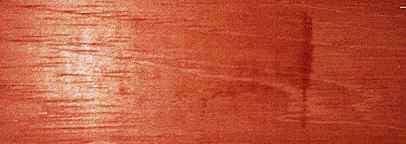
Acajou rouge (Cedrela huberi)
Family: Meliaceae
Common names: Acajou rouge, Ceder, Cedrat, Cedre rouge, Cedro, Cedro branco, Cigar box, Cigar box cedar, Epi, Kapere, Red cedar, Soeren, Spanish cedar, Thitkado, Toon, Youhom
Distributed in: Bahamas, Brazil, Cuba, Dominican Republic, French Guiana, Guyana, Haiti, Honduras, Jamaica, Suriname (Central America, Latin America)
Common uses: Bedroom suites, Boat building, Building materials, Cabinetmaking, Canoes, Chairs, Chests, Cigar boxes, Concealed parts (Furniture), Decorative plywood, Decorative veneer, Desks, Dining-room furniture, Dowell pins, Dowells, Drawer sides, Drum sticks, Exterior trim & siding, Exterior uses, Figured veneer, Fine furniture, Floor lamps, Furniture , Furniture components, Furniture squares or stock, Hatracks, Interior construction, Interior trim, Kitchen cabinets, Lifeboats, Living-room suites, Millwork, Moldings, Musical instruments , Office furniture, Organ pipes, Paneling , Piano keys, Planks, Shingles, Shipbuilding
Product sources: The ITTO reports that a very important source of timber. The timber is exported regularly, especially as square-edged timber and veneer.
Environment profile: The environmental status of this species within its geographical boundaries has not been officially determined. The geographical range of Cedrela is throughout Latin America, from Mexico to Argentina, except Chile. The trees prefer rich, well-drained humid soils, but may also be found growing on drier hillsides
Tree size: Tree height is 20-30 m
and the sapwoodPinkish, White to yellow.The grain isVariable figure, the textureUniformand the lusterLow
Natural durability: Very high natural resistance, Very suitable for exterior applications
Odor:
The wood has a fragrant, cedary scent due to the presence of oil which may exude and appear on the surface of the timber as a sticky resin
Kiln Schedules: Schedule H (4/4) United Kingdom
Drying Defects: Slight collapse and honeycomb, Slight twist/warp
Ease of Drying: Fairly Easy
Comments: Volatiles in the material may restrict the use of the wood in some applications. Timber from younger or fast-grown trees is commonly less resinous
Blunting Effect: Blunting effect on machining is slight
Boring:
The wood is difficult to bore cleanly
Carving: Easy to carve
Cutting Resistance: Easy to saw
The wood saws without too much difficulty, though there may be a tendency towards woolliness, and resin may clog tools. Cross-cutting and narrow bandsawing operations are satisfactorily
Gluing: Satisfactory gluing properties
Mortising: Good mortising properties
Moulding:
A French head yields the most satisfactory moulding
Movement in Service:
A French head yields the most satisfactory moulding
Nailing: Holds nails well, Satisfactory nailing properties
Planing: A good finish may be produced in planing if the cutting angle is reduced to 20 degrees
Resistance to Impregnation: Sapwood is permeable
Response to hand tools: Easy to machine
Routing recessing: Good in both routing and recessing.
Steam bending:
The wood is suitable for bends of moderate radius of curvature
Turning: Good results
Polishing: Surface treatment advised; Staining: Stains well
;
- Numerical data Metric
- Numerical data English
- Strength properties
- References
 |
 |
 |
 |
| Item |
Green |
Dry |
Metric |
| Specific Gravity |
0,34 |
0,37 |
|
| Density |
|
400 |
kg/m3 |
| Bending Strength |
463 |
778 |
kg/cm2 |
| Crushing Strength |
26 |
48 |
kg/cm2 |
| Hardness |
|
253 |
kg |
| Impact Strength |
|
|
cm |
| Shearing Strength |
|
82 |
kg/cm2 |
| Stiffness |
80 |
97 |
1000 kg/cm2 |
| Tangential Shrinkage |
6 |
|
% |
| Radial Shrinkage |
4 |
|
% |
| Weight |
400 |
320 |
kg/m3 |
| Maximum Load |
0,49 |
0,84 |
cm-kg/cm3 |
| Toughness |
|
92 |
cm-kg |
| Static Bending |
277 |
502 |
kg/cm2 |
|
 |  |  |  | | Item | Green | Dry | English | | Bending Strength | 6595 | 11074 | psi | | Crushing Strength | 382 | 696 | psi | | Density | | 25 | lbs/ft3 | | Hardness | | 559 | lbs | | Maximum Crushing Strength | 3038 | 5890 | psi | | Shearing Strength | | 1176 | psi | | Static Bending | 3940 | 7154 | psi | | Stiffness | 1147 | 1392 | 1000 psi | | Toughness | | 80 | inch-lbs | | Work to Maximum Load | 7 | 12 | inch-lbs/in3 | | Specific Gravity | 0.34 | 0.37 | | | Weight | 25 | 20. | lbs/ft3 | | Radial Shrinkage | 4 | | % | | Tangential Shrinkage | 6 | | % | | Volumetric Shrinkage | 10 | | % | |
Weight = medium
Soft
Max. crushing strength = medium
Dents and mars easily
Compression strength (parallel to grain) = medium
Bending strength (MOR) = high
The species has average, or medium, density.
Boone, R.S., C.J. Kozlik, P.J. Bois, E.M. Wengert. 1988. Dry Kiln Schedules for Commercial Hardwoods - Temperate and Tropical. USDA, Forest Service, General Technical Report FPL-GTR-57, Forest Products Laboratory, Madison, Wisconsin.Chichignoud, M., G. Deon, P. Detienne, B. Parant, and P. Vantomme.1990.Tropical Timber Atlas of Latin America.International Tropical Timber Organization (ITTO, Centre Technique Forestier Tropical, Division of CIRAD, 45 bis Avenue de la Belle Gabrielle, Nogent-sur-marne, CEDEX, France.Chudnoff, M.,1984,Tropical Timbers of the World,U.S.A. Department of Agriculture, Forest Service, Forest Products,Laboratory, Madison.HMSO.1981.Handbook of Hardwoods, 2nd Edition.Revised by R. H. Farmer.Department of the Environment, Building Research Establishment, Princes Risborough Laboratory, Princes Risborough, Aylesbury, Buckinghamshire.Wangaard, F.F., and A.F. Muschler. 1952. Tropical Woods - Properties and Uses of Tropical Woods, Volume III, No. 98. School of Forestry, Yale University, New Haven, Connecticut.
|








